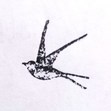Hûw Steer's Blog, page 9
June 23, 2024
Story and Memory
To keep up the streak of announcements, I’ve got a reprint out this week – one of my oldest stories given new life in the latest issue of THEMA, a long-running magazine out in the States. They’re a theme-focused magazine, and when I saw ‘light and shadow’ I immediately thought of an old friend from back in university, ‘A Conversation at the End of the World’. If it qualified for ‘Light and Dark’, it should qualify for ‘Light and Shadow’, thought I – and it did. So if you fancy reading what was originally a short film idea before I realised my complete lack of cinematic talent, and seeing two old friends-turned-enemies watching the stars go out, one by one, you can.

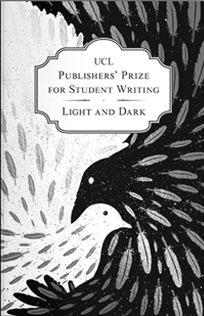
Seeing such an old story of mine back in print made me equal parts nostalgic and self-evaluative. I’ve got quite a few stories out in the world now, in publications big and small, British and American and Australian. I like them all. I definitely like some better than others. The latest, Great Martian Railways, is definitely among my favourites, for reasons I went into last week. It’s one of those with a genuine emotional connection for me – in this case trains – which a fair few of my stories have in very different ways. The Only Cure is based on a bit of history homework I did in about 2008, and so stays close to my heart – The Scar is essentially a vision of Todra Gorge, the sight of which will always be indelibly etched on my mind as a hidden wonder of the world.
I look at my submission tracker, and the pleasingly tall stack of bricks that are my published stories, and it’s like peering into my own memories.
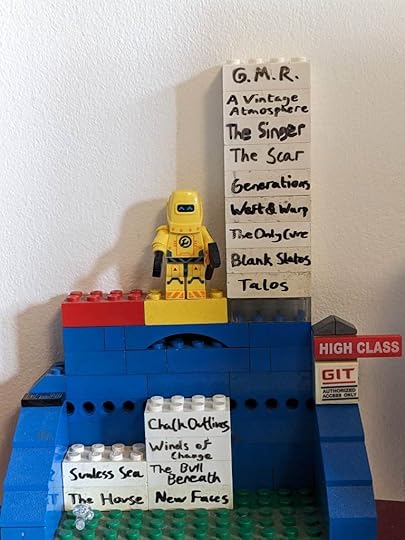 Robot Mechanic holds my laptop power cable when necessary. Lego is a useful thing to have around.
Robot Mechanic holds my laptop power cable when necessary. Lego is a useful thing to have around.And then there are the many, many more stories that are in need of editing, and those bold ones right now out waiting for judgement. Some of them have been submitted many, many times, and I’m sure they’ll be submitted many more. I have some of my favourite work in that pile, and I still hope that one day it’ll find a home, if I can find a suitable magazine to which I’ve not already submitted it.
It’s an unpredictable game, this writing lark. I can write something that I think is the best thing I’ve ever put on paper, and it can languish on my hard drive for years – or I can write something that I think is, for me, a solid mid-tier piece and have it snapped up instantly. All art is subjective, of course, but that fact is seldom hammered home as effectively as when I add another rejection to my list of submissions. As I’ve said before, though, you’ve just got to keep trying. It’s taken me years to build up the modest portfolio I have. It’ll take years more before it’s really worth singing about.
But of all the stories I’ve done, published and unpublished, my favourite might still be the first. Or at least my first proper paid story, The Vigil of Talos, from way back in 2018. It’s not a particularly complex story. It’s got a very big robot punching things in it, which was generously deemed to still be on-theme for the Making Monsters anthology and its compendium of reimagined classical myths. But it’s also about fantasy becoming reality, about seeing an idle dream suddenly brought to life, about a quiet desire being fulfilled. What it’s about for me, looking back, is about being a writer. It’s about seeing my work in print for one of the first times, it’s about realising that I could, maybe, actually make something of myself in this arena. When I see that book on my shelf it reminds me of that moment of acceptance, literal and metaphorical.
It reminds me of where I started, and that I really should keep going.
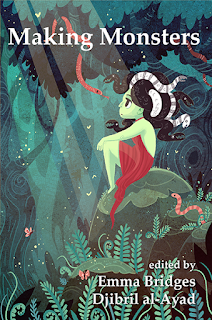
All my stories are available… somewhere. Some will take more work to find than others, some are just up on this blog, their original publishings having long since faded away. Perhaps more of them will be reprinted, some day, and be properly available once again. But if you feel like reading them, you can. You might feel the same way I felt writing them, if you’re lucky.
June 16, 2024
New Story – Great Martian Railways
I like trains.
I’ve always liked trains. Steam trains, of course: none of this newfangled diesel and electric business, with the exceptions of the Really Fast and Floaty ones, because they still feel like science-fiction even though they’ve been around for years. But there’s always been something about those iron behemoths that’s fascinated me. The sheer physicality of steam engines is just a wonder to behold: pistons and wheels and gears as big as your head, all grinding together in slow and steady harmony. No electronics, no computers, nothing delicateat all: just fire burning and metal meeting and becoming wondrous motion.
 80151 at the Bluebell Railway last year.
80151 at the Bluebell Railway last year.I’d have been a great Victorian industrialist. Give me a stovepipe hat and I’d be building bridges and laying rails within the hour.
I adore this sort of analogue technology, as readers of this blog will probably already know. For all that modern science has made things smaller, faster, more efficient, there’s a beauty to the old-fashioned physical mechanism that cannot be surpassed. And just because it’s physical doesn’t mean it can’t be small too! I can sit and watch the clockwork of my pocketwatch for ages.
But the big machines are something else. Steam engines and their ultimate expression: the locomotive, the steam train, yet another staple of my childhood that’s never gone away. I have ridden steam trains across the land – well, mostly various bits of Wales and a few other places – throughout my life, in a carriage and occasionally in the engine itself. Even with such limited exposure to the inner workings of these magnificent machines I’ve always been absolutely captivated by them: these beasts of a bygone era, which might have been out-evolved but are still working, still running, sometimes centuries after they were made.
 Fenchurch here is 151 years old and still going, at the Bluebell Railway.
Fenchurch here is 151 years old and still going, at the Bluebell Railway.You’re not going to see a modern electric train still in working order 100 years from now, I reckon – but the old steam engines will probably still be going even then. They were built to last. They endure, not just physically but in the hearts and minds of small children and large children across the world.
And they will endure into the future. Or at least they will if I have anything to say about it. Which, in the pages of the latest issue of Analog Science Fiction and Fact, I have.
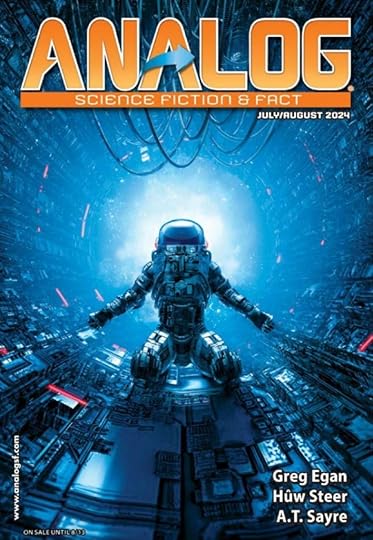 I’m on the bloody cover!
I’m on the bloody cover!Great Martian Railways is about brand-new problems with very old solutions. The problem is getting around on a human-colonised Mars. The solution is, of course, a nuclear-powered steam train. If we can get to the moon on a rocket with less RAM than a modern fridge, we can get across Mars with a modern, but ultimately very old-fashioned machine.
It’s about the same stubborn practicality that brought us the age of steam – the same tenacity that humanity has always shown and always will show. It’s about tackling problems head-on, with a really big spanner and a silly hat. Because what will we be, when we get to Mars, but the same pioneers and visionaries as people like Brunel were all those years ago?
You can read Great Martian Railways in the July/August issue of Analog. You can read an extract on their website right now, in fact! It’s illustrated, it’s in print, and it’s fun.
Nuclear steam trains on Mars. It might be one of the best ideas I’ve ever come up with.
Analog updates its site with every new issue, so for posterity’s sake here’s an archive link for future readers of this post.
June 9, 2024
The Boiling Seas: The Owl in the Labyrinth
The Blackbird and the Ghost is 5 years old. Nightingale’s Sword is almost 3. It’s about time for another Boiling Seas book, don’t you think?
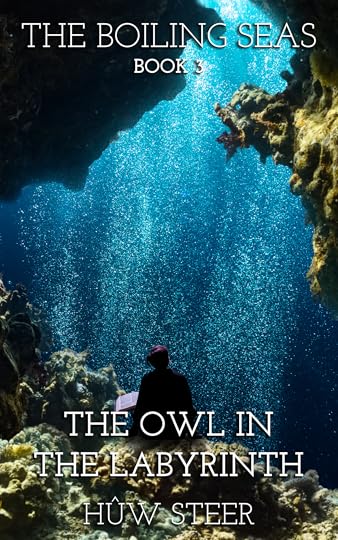 The current version of the cover, by me, and featuring photos by Aaron Burden, Sarah Lee, Neom and Zachary Spears on Unsplash.
The current version of the cover, by me, and featuring photos by Aaron Burden, Sarah Lee, Neom and Zachary Spears on Unsplash.It goes without saying, but this post is definitely going to spoil bits of Nightingale’s Sword, so if you haven’t read that book yet, pause and do so right now.
Tal, Max and Lily have sailed across the deadly Boiling Seas. They’ve explored every inch of their mysterious islands. They’ve even flown high through the steamy skies above them. But they’ve never ventured underneath the Seas… until now. Because Max is trapped, leagues beneath the scalding waves in an impossible house of secrets, and she’s not getting out without help. She’ll have to unravel the mystery of the Scrolls and the Seas while Tal and Lily figure out how to rescue her.
It’s only a journey into the most inhospitable environment on the planet: an ocean of boiling water, floored with molten rock and filled with steel-scaled sea serpents. And it’s not like the most powerful man on the Seas is trying to seize their secrets for himself at the same time, and won’t let a little thing like ‘friendship’ stand in his way.
A race against time, against authority, and against the world itself. Tal, Max and Lily couldn’t be happier.
The Owl in the Labyrinth concludes the Boiling Seas trilogy with a trip to the only part of this world we haven’t yet visited: underneath the actual Seas themselves. I’ve been off-handedly mentioning metal monsters and flying fish for 5 years now, and it’s finally time to meet them up close! I don’t want to spoil the whole book, but it’s been a very interesting challenge getting my protagonists down there safely…
Max is of course the Owl – she needed a bird name to go with the rest of my little flock, and it had to be a clever one. As for the Labyrinth… well, you’ll have to wait and see.
There are lots of loose ends to tie up here, and I might even get to most of them. Who made the ancient scrolls that have driven the plot of this whole trilogy? What are they even for? Who lurks in the mysterious Panopticon at the heart of Port Malice? How will Max escape the Boiling Seas themselves – and how can Tal and Lily keep from each other’s throats without her?
All these and more might be answered in The Owl in the Labyrinth. Probably.
I’m sure there are more effective ways to do these reveals – a bit at a time, getting hype on other sites, all that jazz – but I’m bad at marketing, it’s the 5th birthday of book 1, and when am I going to get a more satisfying reveal time than that? It feels like I’ve been sitting on this reveal for too long, anyway.
Is the book ready to be published yet? Nope. Will it be by the end of the year? Probably. I’m very busy with my own wedding and countless other things but I am getting through this edit and it will be done. And what better way to motivate myself than revealing the title and cover and thus putting a very real clock on my own editing process? It’ll be fine. I hope.
I didn’t really expect The Blackbird and the Ghost to do well. I didn’t write it with a sequel actively in mind, for all that I left plenty of things open for one. But that little book I wrote almost 9 years ago has blossomed into something much bigger than I ever imagined. Its characters have lives of their own that I couldn’t leave unexplored, and as for the world… well, I’m finally getting to the really cool bits. Some of these ideas I wrote down almost 9 years ago and am only now getting to explore.
I’m excited. I hope a few of you are too. Let me know.
And if you’re reading this and want to start your journey on the Boiling Seas in time to be able to finish it, then grab The Blackbird and the Ghost for free until the end of today (Sunday the 9th.) It has been described, by multiple people, as a “good book.” I reckon its second sequel will be, too.
June 2, 2024
From Blackbird to Ghost – How I Wrote It
Just under 5 years ago, I started really being an author.
Wednesday the 5th of June marks the 5th birthday of The Blackbird and the Ghost – not the first book I’d written, even back then, but the first one that I thought might be worth showing the rest of the world. I had absolutely no idea what I was doing back in 2019. I still don’t. But I did it anyway.
How? Well, I’m glad you didn’t ask.
But before I start: from its birthday on Wednesday the 5th until Sunday the 9th, The Blackbird and the Ghost will be FREE in digital form to celebrate.
To talk about how I first wrote Blackbird, I have to cast my mind back a lot more than 5 years – try 9. The second term of my second year of university, grappling with medieval history and mid-rehearsal for a production of The Comedy of Errors… and for some reason, the time I chose to get cracking on not just a new novel but on my first proper short story, too. ‘A Discourse on the Prisoner’s Cinema’ was very hastily written in the History Department common room in January, probably around the time of auditions and callbacks for the aforementioned play.
On the 6th of February, so midway through the rehearsal period, I created a Word doc called ‘Dungeon Crawler’. I wrote the prologue of what is now The Blackbird and the Ghost. I think it was the first line that came to me out of nowhere – which is still one of my favourite lines I’ve written, honestly – and the rest of the tomb and the names just flowed out from there.
 At some point in the intervening years I learned how to format properly, too.
At some point in the intervening years I learned how to format properly, too.Importantly, this wasn’t the Boiling Seas yet. They don’t really get mentioned in that first scene – if they do, I added them in later. Tal was here, his job and moniker were here… but not his world. Not yet. That came a week or so later, when, not just during The Comedy of Errors but onstage – probably during a dress rehearsal rather than the actual live show, but still – I opened up my sketchbook and I drew a map. This map.
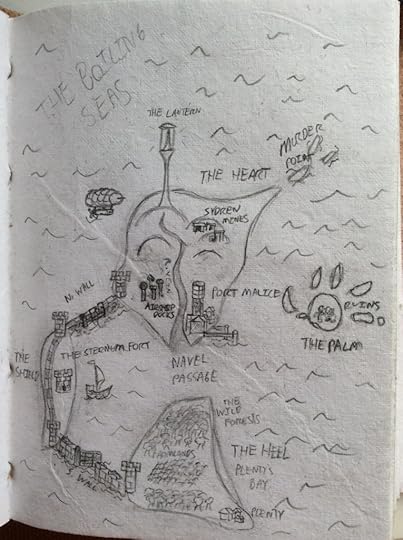 I’m not actually very good at drawing, but I can just about manage a map.
I’m not actually very good at drawing, but I can just about manage a map.For context, I wasn’t anyone important in The Comedy of Errors – just a fruit-seller with a few lines at the beginning, before I and my fellow background cast did Generally Immersive Background Things in the marketplace set around the actual plot. Playing cards, going to the pub, having pineapples stolen by small children, etc. Jotting some things down in a sketchbook was deemed perfectly acceptable, especially as my nice leatherbound sketchbook (which I need to get out again and resume my sporadic attempts to learn to draw well) fit the aesthetic very nicely.
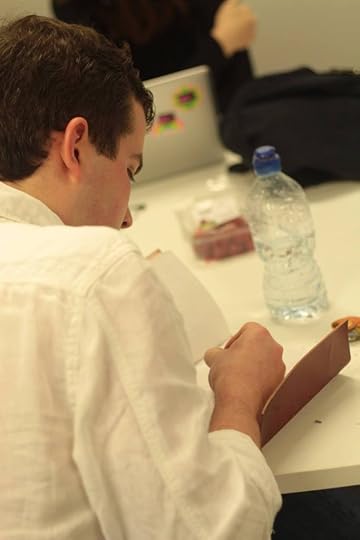 And thanks to Danté Kim I have an actual photo of me starting the map during rehearsal! Look at that tiny beardless face.
And thanks to Danté Kim I have an actual photo of me starting the map during rehearsal! Look at that tiny beardless face.I’m not sure I was drawing the map for my half-started story – but I soon put them together. And I started writing. Apparently, I started writing fast. I created that original Word doc on the 6th of February… and I finished it on the 18th of May. 102 days for a whole book!
No, don’t do the maths and tell me that’s only 600 words a day on average when I always write a minimum of 500 anyway. Stop it. Put that calculator down.
Having performed this monumental feat of literature… I then forgot about it for 2 years.
I had things to do: degrees to finish, comedy to write and perform, and some other books to write, too – I think I went onto those cyberpunk novellas next. I should revisit those. So ‘Dungeon Crawler’ languished on my hard drive for some time… but during that time, I became a professional author. In the sense that I got paid for writing things that were then published. And with some short stories under my belt, I belatedly realised that self-publishing was possible – reasonably simple, even, with KDP – and I wondered if I had anything that would suit.
I did, of course. I had ‘Dungeon Crawler’, which had at some point acquired the series title of ‘The Boiling Seas’, though not yet its actual novel title. Almost exactly 2 years after I started writing it, I started editing it. This seems to have been a rather perfunctory process, mostly dedicated to switching Max’s gender… which, after 5 years, I should really do another pass at just to check I didn’t miss any pronouns…
And then I set to work doing this ‘author’ thing ‘properly’. I created this website/blog. I began unravelling how KDP worked. I spent far too long making a cover with some really rubbish photo editing tools.
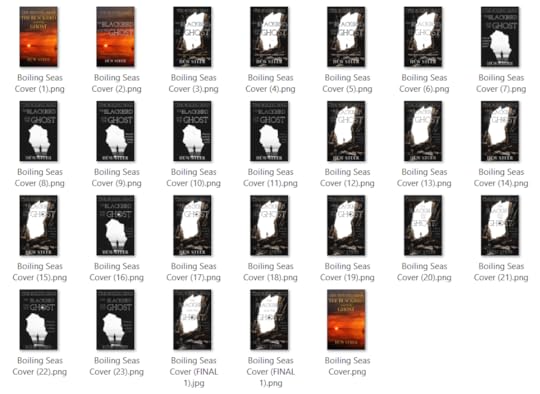 This isn’t all of them. It’s really not.
This isn’t all of them. It’s really not.I tweaked. I massaged. I enlisted for the first time my long-suffering proofreaders (my dad and my friend Jack). I tweaked some more. It was a leisurely process. Back then, I hadn’t started a streak of a book every year or so. Back then, absolutely nobody knew who I was.
At some point, I came up with a title.
And then, on the 5th of June, The Blackbird and the Ghost spread its wings and flew.
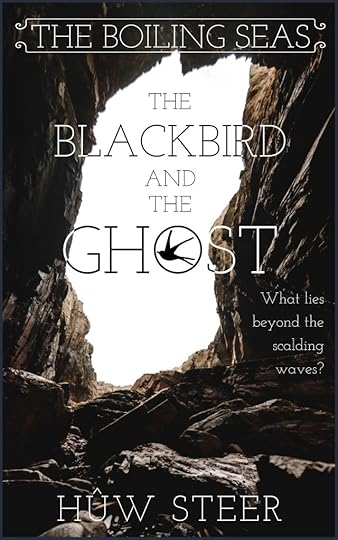
It did ok. It did far better than I’d ever realistically expected. Some people – perhaps even some of you – read it. Some people even reviewed it. It’s been in competitions – it made the semi-finals of the SPFBO, which is the best I’ve ever done in any of the SP things. It’s had one sequel, and I’m working on another.
More than 1100 people have a copy of The Blackbird and the Ghost, at the time of writing. It’s taken 5 years for that to happen, of course. But Tal Wenlock and his little witchlight have come a long way since February 2016.
I’m proud of this book. It’s not that long. It’s a bit messy. The plot isn’t the strongest even if I do like the worldbuilding an awful lot. There are typos. There are mistakes. But it’s mine. And people, by and large, seem to have liked it.
I liked it enough to keep the story going. Nightingale’s Sword is also a book I’m proud of, as – hopefully – will be its sequel, the conclusion to this completely accidental trilogy. I just didn’t want to leave those characters where they were, and they didn’t want to stay there, either. Who knows when I’ll really be done with those three birds?
Blackbird was the first book I thought was actually good enough for other people to read. It was a big step. Putting my work out there for the entire world to judge was and remains terrifying. But now, I at least know that a handful of people will probably read whatever my new ventures are. Back then… I had no safety net, beyond a few kind friends who picked up a copy. I had nothing but faith in my words.
It paid off.
5 years later, here I am editing Untitled Boiling Seas Book 3. I’m so much busier than I was back then. There’s so much less time and headspace to get stuck in. But I can still dive into that world I accidentally created back in 2016, no matter what else is going on. And soon you lot will be able to do the same.
The Blackbird and the Ghost is 5 years old. I’ve talked about its past. Next week, I think it’s about time I talked about its future.
Stay tuned.
And get a free copy next week if you haven’t already – and if you have, please tell me what you thought of Blackbird, in whatever way you choose.
May 26, 2024
Hijinks and Mild Peril
Last night I went to space.
Well, as close as one can easily get. For you see, dear reader, yesterday was probably the nerdiest day of my life, and one of the most fun.
We began at MCM London – as , no less, for an excellent gig – and promptly headed straight off to my stag do, where after much merriment and lightsaber stage combat training, we ended up on a spaceship under a railway arch in Vauxhall. Specifically Bridge Command, which is, to put it succinctly, absolutely bloody marvellous.
 Yes, that is technically the wrong uniform for this universe. Let’s say I’m on an officer exchange program, that’ll do.
Yes, that is technically the wrong uniform for this universe. Let’s say I’m on an officer exchange program, that’ll do.I have played the Star Trek tabletop RPG before, and had a great time getting thoroughly into character as a spacefaring sailor. But as fun as rolling dice and theatre of the mind can be… they’re not an actual, fully-constructed spaceship set, with functioning consoles, exploding fuses, live actors, and space for 11 men to form a motley, but fully uniformed crew as we gave The Order.
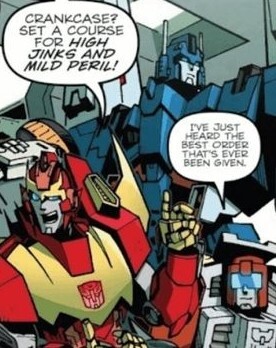 Lost Light #25 (2018)
Lost Light #25 (2018)I had a mere 3 buttons to press… because I was the captain, and so I had 10 people to prod instead. We set off into space with a clear, simple mission, which we ended up almost completely ignoring in favour of much more immediate side-quests that popped up en route. We rescued stranded spacers, we hit a lot of asteroids, and I got to ‘diplomatically’ hang up the space-phone on sarcastic bad guys before ordering their fiery destruction.
It was an absolutely glorious time. Everyone had their own tasks, all intersecting with each other and largely meshing together into a successful mission. We didn’t all die, which was a bonus, despite a few friendly fire incidents. Bridge Command is of course legally distinct from Star Trek but it was exactly like being in an episode of it, down to the clothes on our backs.
I’m not just writing this as a gushing review of Bridge Command, though it also is – if you like Star Trek you should absolutely have a go at this, it’s amazing – but to expand more generally on that particular brand of storytelling that is improving, or immersive, or just play, if you really want to cut to the core of it. I’m a writer: most of the stories I tell are acted out in the theatre of my own mind. I know what I want to depict – I just have to pick the words that describe it perfectly. Sometimes I even succeed. But these scenes in my head are vivid, real, and turning them into words is often very hard indeed.
DnD, and other RPG stuff like that, is another way to realise those stories. If I’m the game master then I may be writing some things down, but reacting to my players off the cuff, in character; if I’m the player, then I’m the one acting and reacting and shaping the story through my direct choices. Basically this adds an audio track to the theatre of the mind (or something of a visual if you play with miniatures, etc.). You might not choose the perfect words if you’re improvising a speech, but they are more directly your words, your actions, your choices.
And then there’s something like Bridge Command – where you’re physically running around, interacting, reacting, with a real set and tools. The theatre of the mind is now the theatre of the body, too, and it feels good.
But I’m not saying that you can only experience the best storytelling by literally being immersed in it. These experiences are amazing fun… but all the bells and whistles, all the physical props and actors, aren’t the core reason this sort of thing is so much fun. They are so much fun, but the root of it is much simpler.
I’m an adult, now. I’m getting married and everything. I no longer spend my days running around with my friends, interesting sticks in hand, playing at being Jedi, or soldiers, or superheroes. But it’s a feeling you never truly forget, or at least that I’ve never forgotten. You, your friends, and your imaginations can build whole worlds out of a cardboard box and a couple of sticks, half an hour’s break at a time.
Because that’s what DnD is. That’s what Bridge Command is. That’s what, for all that it’s more solitary, writing is, for me. All these things, when you boil them down, are playgrounds. They’re ways to tap back into that childish joy and imagination, and to bring your friends back with you. They’re ways to forget about all the boring, serious stuff of life and just play again, which is something that I think we should all do more often.
Sitting on that starship bridge, surrounded by my friends – by some of the friends with whom I ran around the playground with those years ago – I was a kid again. And looking at their faces, I think my friends were too.
Also, we did get to fight with lightsabers, which has never not been fun in the history of humankind.
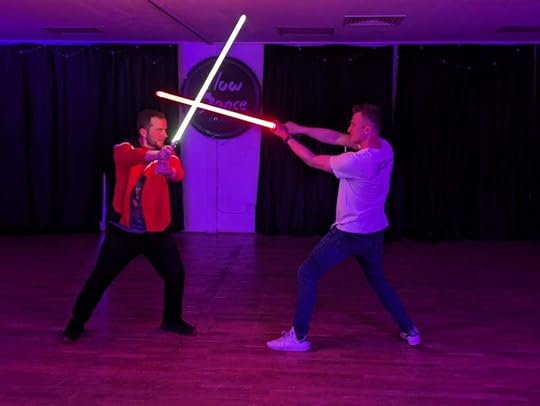
May 19, 2024
Writing What You *Don’t* Know
I find myself faced with an interesting writing challenge over the next two weeks: writing in detail about something I’ve made up. An upcoming something, in fact.
Now obviously I do this a lot, to a lesser degree: if you read this blog at all then you’ll have seen me waxing lyrical about my inspirations and working processes for various stories and books. But this time is different. This time, I can’t just talk about the overall vibe and emotions of the story, though they will of course be important.
This time, I have to talk about… science.
Despite all the SF that I write, I am not a scientist. I am a historian. And I do still write plenty of history for work: telling the stories of real people is still very much within my wheelhouse, even this many years after I actually studied it. But that’s still telling stories, even if it’s not fiction. This will be different. This time I actually need to make some degree of sense, which means doing a lot of checking of the research that went into the original story all that time ago. I’m fairly sure that there was some scientific fact buried underneath all the other stuff. I certainly hope there was.
I’ll see how that goes, anyway: said writing won’t be directly posted here, but I will be sure to link it so you lot can read it too. But as I get started on writing this up, it makes me consider just how important I think writing like this is: not just writing fiction but writing about the writing of it.
When I’m actually writing, I’m often not thinking consciously at all about why I’m using the words I am, why I’m constructing a character or environment in a particular way. So much is instinctual or subconscious for me. I can look back at a piece and find completely unexpected themes which I’ve accidentally been building on, even when I might have been deliberately leaning towards a different moral or outcome. It’s one of the reasons that I end up so often, in my longer works, having to go back and restructure the beginning to match what the end became: if I’m writing a piece for long enough then I have the opportunity to notice those themes starting to evolve and adjust my later words accordingly.
Storytelling is largely organic for me: I’ve talked before about how I liken it to hacking through a jungle, perhaps with a destination in mind but no precise idea what might be hiding behind the next stand of ferns. So looking back at the journey and thinking about why I made those choices, essentially analysing my own work (thank you, A-Level English Literature) is an immensely profitable thing for me as a writer. I’m never going to improve as a writer unless I can understand what made a story good.
So this article I’m writing will be a very useful one. I already think that the story in question is one of my best works. But doing this will hopefully help me understand why – and as it’s a lot more ‘factual’ than what I normally write, hopefully help me get better at incorporating actual science and all that jazz into my future stories.
It’s always a learning experience, this writing thing – whether that’s the research, or the writing itself.
May 12, 2024
What Am I Doing: May 2024 Edition
Right, it’s been a couple of months. What’s been happening?
In my life: quite a lot. The summer is the busiest time of year for me at work, given all the children running around everywhere, and my free time is rapidly becoming dominated with stuff. Concerts (!), parties, and so many weddings, including mine, for which a lot of planning is still necessary. At some point I need to write some speeches. I have ideas. Some. First I need to get the rest of my suit.
In writing: well, stuff is happening. As a result of the aforementioned Stuff Going On I’ve still been doing my relaxing Going Somewhere story just to keep my hand in while I let a bunch of different ideas simmer away in the back of my mind. I have a few loose short concepts that need fleshing out, as well as stuff for my next grimdark RPG session, because I’ve painted some cool models lately and I need an excuse to use them for something.
I’ve also kept up with agent submissions and the like, including the Angry Robot open submission window, to which I have hurled Salvage 7 in the vague hopes of someone at least reading it. We’ll see how that goes. And while I haven’t been submitting any more shorts (because I haven’t finished any), I should have some nice publication news coming soon…
As for Boiling Seas 3: the edit doth progress. I’m approaching the end of Part 1 (of 3), which shouldn’t take too much tweaking beyond cutting it down a tad… until the ending, which I intend to change quite significantly to lead into my revised plan for Part 2. That looks like it’s going to basically be a rewrite of one of the plot threads to accommodate the changed Part 1, but that’ll just become my daily writing and shouldn’t take too long. A lot of the pieces I’ll need to use are there – villain setups, evil plans, etc. – they just need moving around and recontextualising. One of my main issues with the first draft was how the actual antagonist of the story, while showing up near the start, didn’t do that much antagonising until the very end – so I’m bringing them to the forefront and letting them get some good dastardliness in early.
I have, however, invented the hoverboard, which I shall add to radios and submarines in the list of ‘modern technologies I’ve reinvented with magic’. That’ll be fun when it turns up. In the hands of my other sort-of-antagonist, who I also intend to tweak to make more of an obstacle, though not intentionally. I can’t really explain how they’re not actually evil – as actively helpful as possible, in fact – but still a problem, without spoiling a lot of story. But they’re a fun character, I must say.
Juggling all the threads of a trilogy is a tricky task. Doing so with a split POV is trickier, especially when the POVs are physically split, with different stuff going on in different locations. I’ve done ok so far, but getting the balance right is hard, and getting the recombination right is harder, when everyone’s back together and facing off against the same enemy. It should work out alright. There are just so many ideas I want to finish realising in this conclusion and only one book to do it in.
Yeah, this is going to be a bit of a brick. But if you’ve read this far already, I don’t think you’ll mind all that much.
May 5, 2024
A Particular Set of Skills
I would like to have a very particular set of skills. But for now, I’ve just been giving those skills to my protagonists instead.
I went axe throwing yesterday, which was rather entertaining, even if I can see why it never really caught on in the olden days (why lob your weapon in the general direction of the enemy and hope the right end hits them when you can just walk a bit closer?). I was of course spectacularly bad at it, but it was fun, and it approaches a slightly different skill that I’ve always wanted to learn: the slightly more practical and much cooler ability to throw knives. It’s been on my list for ages, as utterly impractical as it is and as more niche it will be to learn… but one day I’ll be flipping knives around the place like darts.
Another thing I’ve always wanted to be able to do is pick locks, which is a somewhat more achievable talent, as well as being more practical if I ever lock myself out of my house, for instance. I have secured some practice locks from a friend, so if I actually get around to obtaining the necessary tools then I can get cracking.
It was when I put these things together in my head that I realised that what I want, essentially, is to be a fantasy rogue. I want to throw knives, crack open doors, learn to fence properly. I want to be as cool as, to have the talents of, my favourite two fantasy rogues, Tal and Lily Wenlock from the Boiling Seas. In the absence of having these actual abilities myself I have imparted them to my characters – I can do a bit of vicarious Cool Stuff through their adventures. It’s a lot easier, and rather fun too.
But I’m going to have to learn the rest of these skills one day – or at least try them out. Just like I’ve been wandering around my house while wearing my new gauntlets so I can understand what heavy armour feels like, I want to test out the other skills I throw at my characters. Axe throwing was a good step, but I realise even as I write this post that I’ve been working on one Wenlock skill in my free time without even realising: climbing. Those of you who’ve read Nightingale’s Sword will know that there’s a fair bit of scaling of walls and rocks, and there’ll be more in Boiling Seas 3. No self-respecting rogue skimps on the ability to scale a fence or crack open a high window, after all. But I’ve been climbing regularly for a couple of years now, so I can actually write a difficult climb with the experience needed to make it vaguely realistic.
Writing is a learning process in itself: I’m always finding new ways to wield words. But it can be a learning process in so many other ways, too, and the learning, I find, is one of the most fun parts.
So lockpicks next, and I’ll be able to actually understand what pins and tumblers really are. Then I should really look into fencing, and maybe my fight scenes will get a bit better…
Or at the very least, I’ll have a good time.
April 28, 2024
Small Steps
When I need something to write, when the Big Ideas aren’t quite flowing and I just need to get words on paper, I have a default. I have a theme that I return to, over and over again. It fits like a glove… or in this case, a boot.
There are many settings, there are many plots that occasionally evolve. But there is always, at the core, someone walking.
I pick up in media res and set a character walking. I usually don’t bother naming them, I just set them off. I almost never have a destination in mind, a purpose for the journey, and sometimes my fresh protagonist doesn’t either. They’re just going, step by step, mile by mile. They are alone, normally, save for the occasional bird or other miscellaneous bit of wildlife: alone with their thoughts, and with the wind, and with whatever terrain they’re crossing.
This is the bit that varies, according to my mood, or my idling imagination, or occasionally from whatever I’ve been reading or watching of late. I’ve done deserts, I’ve done mountains, I’ve done space – and perhaps most importantly I’ve started with fields, though those last two stories took on a little more life of their own. You never know where a story’s going to take you – and I do mean you – after all. But this is also one of the most important bits, really: the environment, the place which the unnamed protagonist is passing through, and the place that my idling imagination can warm itself up through describing. It’s the sort of writing that I love doing but there is so often not enough space and time for in my published works: you do, at some point, have to get to the plot. But lavishing detail on every rock, every patch of lichen, the whistling of the wind or the heat of the sand… it’s relaxing. If reading is escapism then writing is too, and I find few things more escapist than immersing myself in describing a foreign environment from bowed head to striding food.
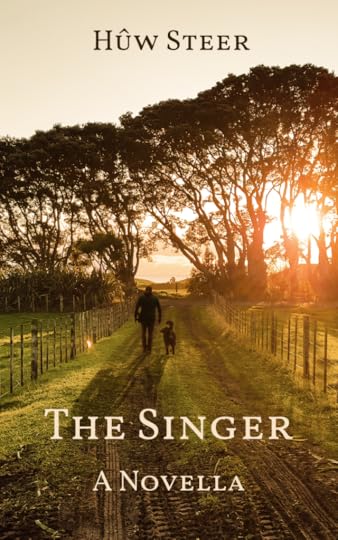 It started as a wish to walk in the fields of home again. The plot came knocking at the pub door some time later.
It started as a wish to walk in the fields of home again. The plot came knocking at the pub door some time later.But the walking is key. The travel, the journey, is key. Just describing a place isn’t enough to scratch the creative itch for me. I need that sense of progress, of motion. Whatever weary traveller I’ve sketched must be travelling, no matter how much they, or I, might want to stay in the little clearing in the woods I’ve just drawn up, with its fragrant wildflowers and birdsong.
There’s probably a much stronger creative metaphor or insight in here somewhere, but their progress is my progress, for all that these stories often go pretty much nowhere. To break myself out of a creative rut I spin my wheels by not spinning my wheels, by making someone else get moving… anywhere, really. And it works. My brain gets moving right alongside my nameless protagonists, and I merrily switch over to my main projects with my creativity nicely refreshed.
To all those nameless people who still languish in the middle of the desert, or high on some mountainside, I salute you. I do finish most of these rambling tales but there are a good few left undone, as there are plenty of other, more focused works that I’ve never finished. But those nameless wanderers are special. Their task is simple, but vital. They journey so my mind can too.
April 21, 2024
What Is Sci-Fi, Anyway?
Different people have different opinions on what constitutes ‘real’ science-fiction. This is inherently absolutely fine – there are a lot of stories out there and they’re all going to hit differently. But what’s been rattling around my head for a while is that not all of these definitions are actually defining the same thing.
I should probably explain that.
Back when I wrote my dissertations on the history of sci-fi, I considered a few definitions of the genre before picking my favourite, which was coincidentally a definition that made Lucian’s True History count as science-fiction. Handy, given that if that wasn’t the case I wouldn’t have been able to write the essay. (Or Ad Luna.) Essentially the problem as I encountered it was this: does science fiction have to be about ‘science’? Brian Aldiss and David Wingrove thought so: their Trillion Year Spree cites Frankenstein as being “the first real novel of science fiction”[1] – anything earlier is “pure fantasy”.[2] This is the science-centric version: sci-fi that doesn’t rely on the progress of science, on some kind of critique of the progress of technology, isn’t sci-fi. It’s just… well, ‘fi’.
But I didn’t like this definition – it always seemed too narrow, too exclusive, and too focused on specific content than on theme. Darko Suvin’s definition – the idea of ‘cognitive estrangement’, of showing the reader a world that is in some way different and forces them to reflect on their own world – is more appealing. [3] This for me is what sci-fi is all about: tweaking something about the world and exploring all the changes and fallout from that tweak. What if we could build perfect humanoid robots that could be walking among us right now? Blade Runner. What if censorship went so far that we started burning all books? Fahrenheit 451. This definition makes sci-fi all about ‘what-ifs’, and that for me is far more important than the actual presence of ‘science’.
Just because your sci-fi story features some sort of future science doesn’t mean it’s really about that science. The other half of the debate is ‘hard’ versus ‘soft’ sci-fi; stories that hinge around the exact and factual mechanics of the Big Science Thing versus stories that don’t really care and would rather explore the world more generally instead.
But the thing is that neither of the above definitions has to be wrong… because they’re actually talking about slightly different things. Suvin’s ‘cognitive estrangement’ doesn’t just apply to stories that we’d consider sci-fi, after all. There are plenty of fantasy stories that do the same thing: present a world very similar to our own but with the addition of some novum – the Different Thing – that completely changes how the world works. The Temeraire books, for instance: they’re indisputably fantasy, but fundamentally they’re set in a recognisable 1800s world, just with the addition of dragons, and all the societal changes that entails. They’re not sci-fi – but they fit Suvin’s definition anyway.
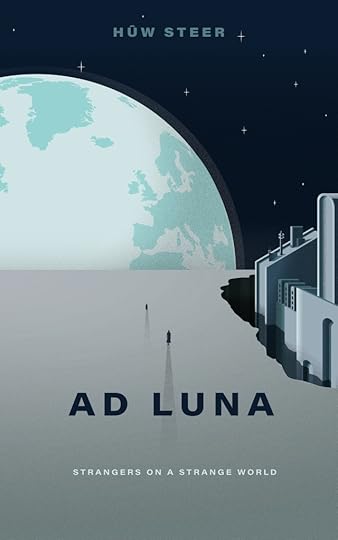 Is Ad Luna science-fiction? Some competition judges have said yes, some have said no. Definitions are weird.
Is Ad Luna science-fiction? Some competition judges have said yes, some have said no. Definitions are weird.And the True History, too. There is not a drop of science in Lucian’s satire, but it’s all about those novums – an enlightened Lunar society, but they’re all male! An island of trees, but alive! And all of these things reflect in some way on contemporary Greco-Roman society. So too Star Trek, the spiritual descendant of the True History: yes, it’s in space, yes, it’s dealing with representations of racism or Communism but through a distorted, fictional lens… but for all the technobabble and future tech, it’s not really about science, is it? It’s so fantastical as to be divorced from most modern understanding of technology and science. And you’d never say that Star Trek isn’t science-fiction.
So what am I getting at? Essentially, over the years, we as a literary society have managed to hopelessly overlap and confuse two linked but different genres: science-fiction, which is about reflecting and critiquing our world through some technological or scientific novum, and speculative fiction, which is about reflecting and critiquing our world through any kind of novum. When most people say ‘science fiction’ – including myself – what we actually mean is ‘speculative fiction’, the broader genre to which sci-fi belongs. Much fantasy is speculative fiction; pretty much all sci-fi is speculative fiction; and plenty of other stories which don’t quite feel right as either of the above can be speculative fiction too. It’s in the name: speculative fiction, speculating about how a world would change with those little twists and tweaks.
But because there’s so much science-fiction and because it’s the most obvious carrier of the spec-fic torch, the names and definitions have blurred. Basically all sci-fi is spec-fic, but not all spec-fic is sci-fi – there’s just so much sci-fi that it’s very easy to think of it as being the whole genre instead of just a part of it. And this is why the oft-repeated argument of ‘is this real sci-fi’ exists at all. Take Star Wars. Hardcore sci-fi fans, those who want the science to be hard, front and centre, of their stories, would say Star Wars isn’t sci-fi. But, cry legions of other fans, it’s in space and it’s full of lasers, FTL and robots: of course it’s sci-fi. The former are arguing about science fiction – the latter about speculative fiction. They’re both right – but they’re applying the same name to two slightly different genres. ‘Space fantasy’, which is probably a more accurate description of what most Star Wars stories are, is speculative fiction, but it doesn’t fit a tighter definition of science fiction.
This is obviously a hopelessly lost cause at this point. We’re all so used to applying the term ‘science fiction’ to the umbrella of ‘speculative fiction’ that it’s just ingrained in out lexicons now. But I think it’s worth pointing out. There is room for everything in the wider spec-fic umbrella, if we all play nicely… and as long as we can all agree what we’re actually talking about.
[1] Aldiss, Brian & Wingrove, David, Trillion Year Spree: The History of Science Fiction (House of Stratus, 2001), p.36
[2] Aldiss & Wingrove, p.57
[3] Suvin, Darko, Metamorphoses of Science Fiction (Yale University Press, 1979), p.10

